|
|
|
Sort Order |
|
|
|
Items / Page
|
|
|
|
|
|
|
| Srl | Item |
| 1 |
ID:
127605
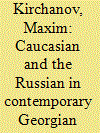

|
|
|
|
|
| Publication |
2013.
|
| Summary/Abstract |
The author analyzes the recent and traditional political and ideological trends in Georgian nationalism. He points out that it is based on a fairly mature political tradition and is largely developing as a civil movement. Its present polarization and fragmentation are an inevitable outcome of the political debates about the role Georgia is playing in the region and its relations with Russia.
|
|
|
|
|
|
|
|
|
|
|
|
|
|
|
|
| 2 |
ID:
127608


|
|
|
|
|
| Publication |
2013.
|
| Summary/Abstract |
All of Central Asia's river water resources are transborder and used by the upstream countries (Tajikistan and Kyrgyzstan) for generating electricity and by the downstream countries (Kazakhstan, Turkmenistan, and Uzbekistan) for irrigation. However, since the 1980s, the region has been experiencing an acute shortage of water for irrigation farming, while only 5% of the hydropower resources are being tapped.
The future of Tajikistan's economy, a country situated on the upper reaches of the rivers of the Aral Sea Basin, depends entirely on the accelerated development of the energy industry. However, Tajikistan does not have any industrial reserves of oil and gas, while its coal fields are difficult to develop since most of them are located in hard-to-access mountainous regions. This means that the only way to successfully build up Tajikistan's energy industry is to develop the country's hydro resources, of which the country has enormous reserves.
Building small hydropower plants is only expedient in terms of supplying energy to small consumers in the remote mountainous regions. Completion of the Rogun Hydropower Plant on the Vakhsh River, the construction of which began in the 1970s, is the most promising hydropower project in Tajikistan today. The hydropower plant building site currently boasts a developed infrastructure. According to expert assessments, the plant is around 30-40% complete. Once in full operation, the Rogun Hydropower Plant will make it possible to double electricity generation and ensure sustainable development of the republic's economy in the near future.
However, we should keep in mind that the Vakhsh River is a transborder river; the Rogun Hydropower Plant can only function efficiently if its construction and exploitation are safe and reliable, and if the national interests of the downstream countries are taken into account. These countries must officially define their interests in the form of specific demands regarding the regulation of water runoff regimes.
|
|
|
|
|
|
|
|
|
|
|
|
|
|
|
|
| 3 |
ID:
127598
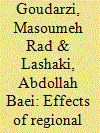

|
|
|
|
|
| Publication |
2013.
|
| Summary/Abstract |
Iran and Azerbaijan are key countries in the Caspian Basin thanks to their historical continuity, religious and cultural similarities, shared energy resources, and strategic position. However, since Azerbaijan gained its independence, complex and contradictory interactions have been shaping their relations and influencing the region's dynamics. At the initial stage, their relations were affected by political and ideological differences, as well as the sharp increase in the geopolitical importance of the Caucasus and the Caspian Basin in past two decades. Nor could the role of external factors be ignored. The formation of new borders and political blocs, as well as access to energy resources have made the region a focal point in world geopolitics and provided grounds for the intervention of regional and transregional powers aiming to attain their security, as well as their political and economic interests.
This study examines security, as well as the political and economic factors at the internal and external levels that have contributed to escalation of the conflicts between Iran and Azerbaijan in the past two decades.
|
|
|
|
|
|
|
|
|
|
|
|
|
|
|
|
| 4 |
ID:
127593
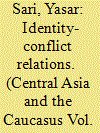

|
|
|
|
|
| Publication |
2013.
|
| Summary/Abstract |
This study aims to describe and explain the relations between identity and conflict by drawing on different theoretical approaches in political science. It examines the questions of whether collective identity, either on a national, civilizational, religious, or social level, is an important variable in trying to understand current conflicts, as well as the prospects for formulating identity-based approaches to conflict. In other words, is it even possible to think about collective identity and conflict simultaneously? This gives rise to another question: Why is collective identity an important factor for explaining the conflict in the Ferghana Valley?
The Ferghana Valley has played a role both in establishing stability in Central Asia and in becoming the starting point of violent conflict throughout the history of the region. The valley became administrationally and ethnically divided into several parts during the Soviet and post-Soviet era. Currently, the tension among the different ethnic, social, and political groups is high because of overpopulation, the increasing scarcity of water and arable land, and the economic hardships and social differentiation that occurred during the political, economic, and social transformation after the Soviet Union collapsed. The Ferghana Valley, at the heart of Central Asia, has become one of the most conflict-prone areas in Central Asia. For these reasons, the valley is a good area for testing the explanatory power of different approaches of political science to explain identity-conflict relations.
Ethnic issues are still extremely important for understanding much of the tension arising in the valley. Not only is there division among the Kyrgyz, Uzbek, and Tajik people, the issue is further complicated by the hostility between different identity-groups and minorities in the region. Additional pressure is arising due to the fact that not only does this tension exist inside each state, it could also escalate to the interstate level.
|
|
|
|
|
|
|
|
|
|
|
|
|
|
|
|
| 5 |
ID:
127595
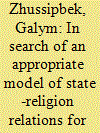

|
|
|
|
|
| Publication |
2013.
|
| Summary/Abstract |
Secularism may take different shapes and forms in different contexts, from aggressively hostile toward religion to accepting and standing for the public visibility of religion. The latter model, which is depicted as passive secularism, can be qualified as a human rights-oriented and democracy-friendly model. Secularism in Turkey is undergoing fundamental transformation from assertive to passive, and the process is still going on. The continuing evolution of the "Turkish secularism" model cannot be understood properly without taking into account the peculiarities of the "internally-driven" and gradual evolutionary transformation of the Turkish elites, social forces, and society, including the "Özal and AKP factors," which have been crucial in liberalizing political, economic, and sociocultural life in Turkey. In this respect, recent Turkish experience constitutes a striking example for post-Soviet Central Asia. On the whole, passive secularism would be a better choice for the Central Asian countries in building a tolerant, stable, and viable society.
|
|
|
|
|
|
|
|
|
|
|
|
|
|
|
|
| 6 |
ID:
127594
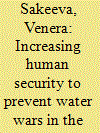

|
|
|
|
|
| Publication |
2013.
|
| Summary/Abstract |
The Ferghana Valley is shared by three Central Asian republics of Kyrgyzstan, Uzbekistan, and Tajikistan. Largely agrarian, the communities residing in the area are heavily dependent on the availability of water for irrigation. As a result of Soviet-backed imaginary border removal and the creation of new borders, the communities became highly vulnerable to state policies and are challenged in establishing relations with each other. The deteriorated environmental conditions, such as dry climate and drought, have only fueled the competition among households to ensure their access to the scarce water resources. Without timely and comprehensive intervention strategies, the region can be compared to a time bomb that could have irreversible consequences.
This article will examine the water problem in the Ferghana Valley from the perspective of a human security approach. In particular, it will analyze the trilateral spurious relations among environmental, economic, and community insecurities derived from the scarcity of water resources and lack of comprehensive water management strategies. To elaborate, it will look into how environmental insecurity has multidimensional impacts on economic and community security in the Ferghana Valley. This research with go on to identify the existing approaches to addressing the aforementioned issues and will scrutinize them to see whether or not they address human security of the communities residing in the Ferghana Valley. Subsequently, the article will propose an alternative solution that meets the principles of human security-friendly policies and will discuss strategies to improve alternative intervention within the framework of "do no harm."
|
|
|
|
|
|
|
|
|
|
|
|
|
|
|
|
| 7 |
ID:
127597
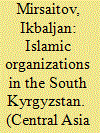

|
|
|
|
|
| Publication |
2013.
|
| Summary/Abstract |
The article examines the ways in which official and unofficial Islamic organizations operate in the south of Kyrgyzstan and analyzes their relations with the state. The author notes that unofficial Islamic organizations are mainly forming and developing in the republic's southern regions. The author singles out moderate apolitical and destructive religious-extremist organizations among them, Tablighi Jamaat and Hizb ut-Tahrir, respectively. He goes on to suggest ways for all the sides concerned (the state, Islamic organizations, and the media) to enter into a dialog aimed at opposing extremism.
|
|
|
|
|
|
|
|
|
|
|
|
|
|
|
|
| 8 |
ID:
127607
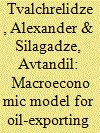

|
|
|
|
|
| Publication |
2013.
|
| Summary/Abstract |
This article explores the relationship between GDP and net oil exports in major oil-exporting countries. The extremely strong positive correlation between these parameters makes it possible to develop GDP models for these countries based on exports of crude oil; it has been demonstrated that they are described by a quadratic regression with acceptable reliability. The study results show that the oil industry is the main driver of economic development in the modern world. Even where direct oil exports make up an insignificant part of GDP in oil-exporting countries, their impact on economic development is decisive.
|
|
|
|
|
|
|
|
|
|
|
|
|
|
|
|
| 9 |
ID:
127599


|
|
|
|
|
| Publication |
2013.
|
| Summary/Abstract |
This article examines several issues relating to migration in the Kyrgyz Republic today. It studies the regulatory and legislative framework and practice of implementing the country's migration policy. The author carries out an institutional analysis of the migration management system. She identifies the most urgent problems of regulating the migratory flows occurring in post-Soviet Kyrgyzstan based on the results of a sociological poll. She also draws corresponding conclusions and offers recommendations for harmonizing all the available migration management tools in practice, which is essential for raising the legitimacy of migration as a whole.
|
|
|
|
|
|
|
|
|
|
|
|
|
|
|
|
| 10 |
ID:
127602


|
|
|
|
|
| Publication |
2013.
|
| Summary/Abstract |
One of the main objectives of the Georgian government is to maintain Georgia's sovereignty, independence, and territorial integrity within internationally recognized borders. The maintenance of Georgia's territorial integrity strongly depends on the effective implementation of the policy of non-recognition of Georgia's separatist regions. This article explains the ways in which the policy of non-recognition of Georgia's breakaway regions can be strengthened. Effective implementation of the non-recognition policy depends on the following factors: 1. Expansion of diplomatic ties; 2. Active cooperation with Western countries and international organizations and their involvement in the implementation of the policy of non-recognition; and 3. Along with the non-recognition policy, implementation of the policy of withdrawal of recognition of Abkhazia and South Ossetia.
|
|
|
|
|
|
|
|
|
|
|
|
|
|
|
|
| 11 |
ID:
127601
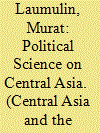

|
|
|
|
|
| Publication |
2013.
|
| Summary/Abstract |
The interest of political science in Central Asia has not subsided: the academic community is paying close attention to the ways new national identities are being shaped in individual countries and to the geopolitical processes underway in the region as a whole, as well as to the results being presented in academic periodicals and exhaustive fundamental publications. Political scientists have noticed that despite certain common features, the local political regimes differ greatly from country to country. All the Central Asian states, those bordering on Afghanistan in particular, are very concerned about the rapidly approaching American pullout and the country's possible destabilization.
|
|
|
|
|
|
|
|
|
|
|
|
|
|
|
|
| 12 |
ID:
127606
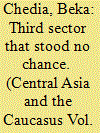

|
|
|
|
|
| Publication |
2013.
|
| Summary/Abstract |
The author analyzes the prerequisites and specifics of the development of civil society in Georgia, as well as the contradictions between society and the state and between society and NGOs. He looks at how the attitude of the people in power toward the electorate changes after elections, as well as at the population's feelings about the state and political elites. He also identifies the factors that interfere with the development of real civil society in Georgia and the methods used to shape public opinion.
He focuses particular attention on the "intelligentsia" as a social phenomenon and describes in detail its involvement in political life and in shaping civil society and public opinion.
|
|
|
|
|
|
|
|
|
|
|
|
|
|
|
|
|
|
|
|
|